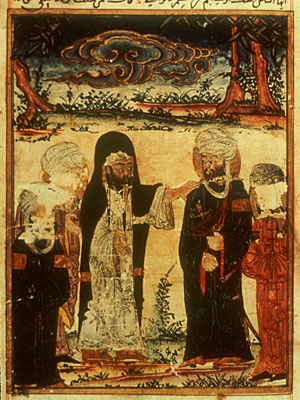Nearly every world history textbook on the market explains the origins of sectarianism in the Islamic world as a dispute over the succession to Muhammad. Sunnis, they say, wanted an egalitarian society in which the leader was chosen from the people; the Shi’a, however, wanted the leadership of the nascent Islamic community to remain within Muhammad’s family. It seems simple—but is it really?
In the first of a series on the origins in Sectarianism in Islam, UT’s Shahrzad Ahmadi expands on this vastly oversimplified version of the story to introduce us to the key players involved—and to the intense rivalry between Aisha, Muhammad’s favorite wife, and his adopted son Ali.
Guests
 Shaherzad AhmadiAssistant Professor of History, St. Thomas University
Shaherzad AhmadiAssistant Professor of History, St. Thomas University
Hosts
 Christopher RosePostdoctoral Fellow, Institute for Historical Studies, The University of Texas at Austin
Christopher RosePostdoctoral Fellow, Institute for Historical Studies, The University of Texas at Austin
A lot of introductory textbooks explain that the difference between the Sunni and the Shi’a is that, when the Prophet Muhammad died—of course, we’re talking about 7th century Arabia—the Sunni believed that the leadership of the community should–it was egalitarian, that the leadership of the community should pass to whoever was the most qualified individual in the community, and that the Shi’a believed that should remain within the family of Muhammad, kind of like a monarchy. Would you say that is an accurate description of the difference?
Well, it’s much more complicated that that—in fact, that’s a huge oversimplification of the situation. Muhammad, after he gets injured and he falls very ill, there was a huge question of, “would a prophet die? Is this even possible?” As we know from the holy texts, prophets could live for hundreds and hundreds of years, so it was sort of bizarre to imagine that a prophet of God would die at such a young age.
How old was he?
He was about 62—he was born in 570, and he died in 632.
So when he did fall ill, and he did eventually die, the choice was between two of his relatives, Abu Bakr, who was his father-in-law by marriage and of course with Aisha, and Ali, who was his son-in-law (also cousin). But it wasn’t necessarily just between a blood relative and non-blood relative. These were both his relatives. And the contestation for the caliphate was also really a new concept. They hadn’t really prepared for this in the way that one would assume because they didn’t anticipate his death.
So since we are talking about two people who are within his family, who are the major members of his family at that point. You’ve mentioned Aisha, who was his wife, and we’ll come back to here in a little bit because she’s a very important figure, and Ali, his cousin/his son-in law and adopted son. Who are the other major members of his family?
The major members of his family—he had a larger family, as you know—Muhammad married Khadija, who was his first wife, and he was monogamous with her as long as she lived. And through her he had six children: two sons, who died, and four daughters.
The daughter that is most prominent in history is Fatima, mainly because she marries Ali, who becomes so important for the Islamic community. And Ali and Fatima end up having several children, two of whom are boys, Hasan and Husayn. This becomes really central for many people.
Because Muhammad didn’t have sons, the question wasn’t should it be his son or should it be somebody else. Many people thought God did not give him a son specifically because they did not want the caliphate to be by blood. But he does have these two grandsons, whom he loves very much.
After Khadija dies, he has several wives. He does not have any subsequent children. He does have one through a Christian, but the son dies en route to him. So he never does have any other children after his children with Khadija.
Ok, so all of his children are Khadija’s children?
Yes.
So, bringing us back to the scene on his deathbed. As you mentioned, his death was unexpected. Was he able to make any preparations or pass the mandate on himself or did they have to make it up as they went along?
So, this is, of course, a very complicated issue as well because Shias will say that, in fact, he did want to pass on the torch to Ali. There are Hadiths, which are essentially stories we either get from the prophet or companions of the prophet. They’re passed down and there’s a lineage to these Hadiths—so we know, hypothetically, where they came from. There are Hadiths that say Muhammad requested Ali’s presence at his deathbed, but was thwarted by Aisha and Hafsa, who were the children of subsequent caliphs, Umar and Abu Bakr, who we’ll get to. And Shias will say that he was prevented from passing the torch to Ali.
But the truth is that this is somewhat of a complicated issue because Ali was somewhat of a disappointment on the field of battle and he didn’t have much in the way of a charismatic force of character. Many of the historians of the period will say that. So when Muhammad dies, Umar, who’s one of his closest companions (and he’s known as the tough guy of this group of companions) really has an emotional collapse. And he rallies behind Abu Bakr.
Ali is washing the body of the prophet, preparing his father-in-law for his burial and Abu Bakr gets the tribal leaders together and gets himself elected as Caliph. So it’s really not as egalitarian as some historians say. The Banu Hashim, which was the tribe that Muhammad and Ali belonged to, are really furious. They want someone from their own tribe to be leaders of the Islamic community. And Fatima, who is Ali’s wife and the daughter of Muhammad, really rallies the Banu Hashim against Abu Bakr, the first Caliph. But she dies, and shortly thereafter Ali aligns himself with Abu Bakr.

So this is of course, the beginning of some tension between them. And Ali, I’m assuming, was younger than the other candidates. Does that also play an issue?
Of course. This could very easily explain the fact that he’s so green behind the ears. He’s not really eager to take over. There are Hadiths that talk about as soon as Fatima dies, he shows up at Abu Bakr’s house saying, “I’m sorry, I’ll back off. I don’t want this; it’s fine.” Like I said before, he wasn’t very experienced in the field of battle. This was also a big issue.
So thus begins the Caliphate of Abu Bakr and it’s 632.
Abu Bakr is the father of Aisha, who has sort of gained a bit of notoriety in the West because she was the woman who was married to Muhammad when she was nine years old, according to some sources. And there isn’t a lot of attention really focused on what happens to her in her later life, for example when her father becomes the caliph. Where is she in all this?
Well she’s an incredibly powerful woman—it’s really a pity that the focus and emphasis is so much on the fact that she was very young when she married. She was also a general in the field of battle later on. She was the daughter of an incredibly powerful caliph. And when she acted like a caliph, which we’ll see later on, she was very politically active and she would hold soldiers in her home as sanctuary.
This was a woman who was very powerful and—even for her time—very controversial.
So, as we mentioned, Abu Bakr is now the Caliph. What happens now that Muhammad is gone?
Well, as you can imagine, the Arabian peninsula still hadn’t been consolidated. And Muhammad dies early. So for the two years of Abu Bakr’s rule, which is 632 to 634, he really consolidates the growing empire and leaves the caliphate to Umar, who we mentioned earlier, and he’s the next caliph from 634 to 644.
As you mentioned, Umar was very strong leader. I remember a story where Muhammad loved good jokes, and had a bit of a sense of humor and actually would forbid people from laughing when Umar would come around because Umar didn’t have a sense of humor and thought laughing was an impious act. So that sort of ranks him on the scale. So what kind of a Caliph was he?
As you can imagine, he was a very powerful, very strong caliph, and, like that story alludes to, he was also a very determined, focused Caliph. No time for laughter. He really made the empire grow in a serious way. He really was responsible for making the empire as big as it was in many ways. He conquers what we now consider Israel, he takes the empire through the Persian empire and starts to make some real headway in the Middle East, and he makes the Islamic community one that serious empires have to really contend with. So made the Islamic community that was isolated in the Arabian peninsula into a huge empire.
And his rule also ultimately comes to an end. Is he killed in battle?
He’s not. He’s actually killed by a Persian servant. And he lives for several days after he’s been attacked, where he presides over the election of the subsequent caliph. Again it’s down to Ali, who’s been passed over twice now, and Uthman. And Uthman was actually also very close to the prophet. There are stories where Uthman would walk into the room, Muhammad would stand up or put something over his legs out of respect. He was a very beloved figure for Muhammad. It comes down to the vote and Uthman gets to become the next caliph and of course Ali and the people who supported Ali are again really furious. Now the third caliph has been elected and it’s still not the son-in-law of the prophet.
Right, because now it’s twelve years since the prophet’s death and Ali’s no longer a young kid.
Exactly.
So Uthman’s rule was more troublesome. Can you talk a little more about what happened under him? He was Caliph for twelve years, if I’m not mistaken?
That’s right. And this is really famous. It’s split into six-years: the good first six-years and the bad second six-years. Some historians will demarcate this breaking moment. There was a ring the prophet had given him. The story goes, he lost the ring and after that his rule, his Caliphate, went down the toilet as they say. So for the final six years he really raises the ire of the Islamic community due to his nepotism. For example, one of his relatives who he had named governor leads a prayer while drunk in Kufa. And this is of course a problem for Muslims because alcohol is forbidden. Uthman didn’t reprimand him.
And it wasn’t an isolated incident. In fact, he gave one of his cousins the positions of treasurer in Medina and he was accused of hoarding money for their tribe. It got so bad that Aisha became really politically active. Out of frustration with her, but also due to his own corruption, he tries to make the pensions of all the widows the same. Aisha was known as the favorite wife, and her pension had always been higher. And she’s furious with him. In fact, she accepts Iraqi soldiers searching for sanctuary and even uses the prophet’s belongings to rally people behind her, saying she knows what’s best for the Islamic community more than Uthman does.
Wow, that’s a tense situation. So how widespread was the dissatisfaction with his rule?
Very widespread. And eventually it reaches North Africa with Egypt. And it was with a group of Egyptian soldiers that things really come to a head. The final straw comes when Uthman appoints his foster-brother as governor in Egypt. And soldiers come to Medina to protest his rule. Uthman concedes some of their demands, but on their return to Egypt, they intercept a letter that was ordering their death.
This was a letter that Uthman had sent?
That’s correct. Furious with Uthman, obviously they return to Medina, demanding his death. They want a different caliph. He’s just too corrupt and they don’t want to deal with him anymore. So they go to the three remaining important companions of the prophet: Ali, Zubayr, and Talhah. And all of them refuse to align themselves with them. This doesn’t matter to them; they end up killing Uthman very dramatically and essentially afterwards they go to Ali and say we want you to be our next caliph and we’re ready to elect you. And this of course is hugely controversial because now he’s been essentially elected caliph by the very people who executed the last caliph.

I can see how that might not sit well with some of the leaders of the community.
Exactly. In fact, Zubayr and Talhah are not happy about it. Aisha’s furious about it. And this introduces the question: “is she a hypocrite”? She had for so long been rallying men against Uthman, but as soon as the Egyptian soldiers appear she actually went on pilgrimage. She said “I don’t want to be involved in this.” And when she returns to find out Ali had been elected the next caliph, she is really upset and says its his responsibility to reprimand the murderers. Of course it’s very hard to do that when those murderers are the ones who just made you Caliph.
Wow. Very tense situation. Was Ali accepted as caliph by the community?
Some people, yes, but a lot of people, no. Aisha especially was, like Fatima—Ali’s late wife—very active in rallying people, this time against Ali. And some people blamed their history together. Aisha and Ali did not have the best relationship. But people were also genuinely frustrated. How could the caliph condone the acts of killing a previous caliph?
So from here we will, in our next episode, begin to talk about the actual schism between the followers of Ali and those who are against him. But I want to thank you for shedding some light on, as you mentioned, a situation that’s frequently over-simplified in the textbooks.